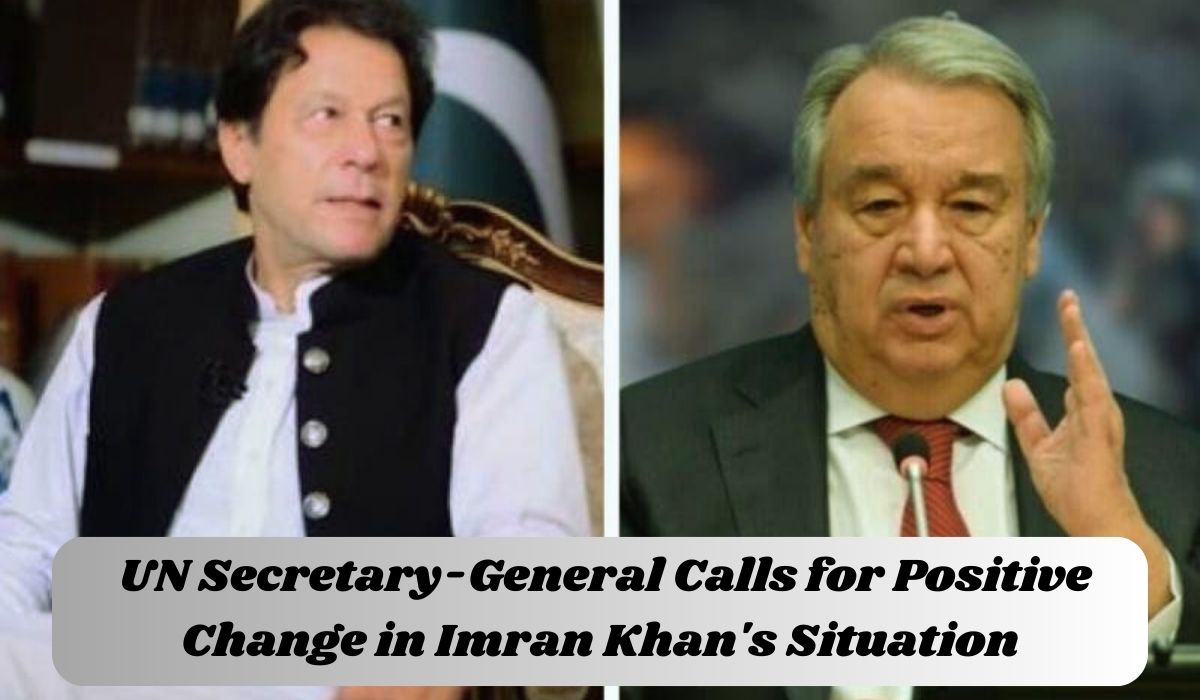UN Secretary-General Calls for Positive Change in Imran Khan’s Situation in 2024!

Overview
- UN’s Position: UN Secretary-General Antonio Guterres urges positive changes in Imran Khan’s situation.
- Pakistan’s Response: Law Minister Azam Nazeer Tarar dismisses the UN report, emphasizing it as an internal issue of Pakistan.
UN’s Appeal for Positive Change
UN Secretary-General Antonio Guterres has expressed a desire for improvements in the situation of Imran Khan, the founder of Pakistan Tehreek-e-Insaf (PTI) and former Prime Minister of Pakistan. This call for change came just two days after a UN group deemed Khan’s detention arbitrary.
Statement from UN
- Spokesperson’s Remarks: Stephane Dujarric, a representative for Guterres, emphasized the need for a more positive development in Khan’s situation. He mentioned this in response to a query during a daily press briefing.
- Independent Panel’s Recommendation: Dujarric clarified that the recommendation came from an independent panel, not directly from the Secretary-General.
Background on Imran Khan’s Legal Troubles
Imran Khan, who founded PTI and served as Prime Minister until his ousting in April 2022, has been facing multiple legal challenges. Since August of last year, Khan has been in prison due to various convictions.
Timeline of Legal Issues
- Convictions: Khan was convicted in several cases, which PTI claims were politically motivated to prevent his return to power.
- Court Decisions: Recently, courts have suspended sentences in two cases involving state gifts and overturned his conviction for leaking state secrets.
UN Working Group on Arbitrary Detention (UNWGAD)
- Recommendation for Release: The UNWGAD issued a statement recommending Khan’s immediate release, calling his detention arbitrary and in violation of international law.
- Rights and Compensation: The group suggested that Khan should be granted the right to compensation and other reparations.

Law Minister’s Response
Pakistan’s Law Minister Azam Nazeer Tarar has firmly rejected the UN’s report, asserting that Khan’s legal issues are a domestic matter.
Key Points from Tarar’s Statement
- Internal Matter: Tarar stressed that Khan’s arrest and legal cases fall under Pakistan’s jurisdiction.
- Rights and Laws: According to Tarar, Khan has been treated according to the country’s constitution, existing laws, and international standards.
- Conviction and Imprisonment: He reiterated that Khan is in jail as a convicted prisoner and emphasized the independence of Pakistan’s legal system.
Current Situation
Imran Khan remains behind bars despite having some convictions suspended and securing relief in various cases. His party claims that the charges are part of a broader effort to undermine his political influence ahead of the February 8, 2024 elections.
Political Context
- Opposition’s Role: Khan was ousted through a no-confidence motion in April 2022.
- Series of Charges: Since his removal, Khan has faced numerous charges, including corruption and terrorism.
- Recent Developments: Although some of Khan’s legal troubles have been resolved, he continues to be detained due to his conviction in the iddat case.
Conclusion
The United Nations’ recent call for positive change regarding Imran Khan’s detention underscores significant international concern and scrutiny over his current situation. The UN’s appeal reflects a broader global interest in ensuring that legal processes are conducted fairly and transparently.
This international perspective adds pressure on the situation, highlighting the need for adherence to human rights standards and judicial fairness. Meanwhile, Pakistan firmly asserts that it is addressing Khan’s case in accordance with its established legal framework, emphasizing its commitment to upholding national laws and due process.
As the legal and political developments continue to unfold, they will play a pivotal role in shaping Khan’s future, particularly in relation to his potential participation in Pakistan’s forthcoming elections. The outcome of these developments will not only influence Khan’s personal and political trajectory but also impact the broader electoral landscape and the dynamics of Pakistan’s political environment.
The resolution of this matter will be closely watched by both domestic and international observers, making it a crucial factor in the country’s political evolution.



8 thoughts on “UN Secretary-General Calls for Positive Change in Imran Khan’s Situation in 2024!”